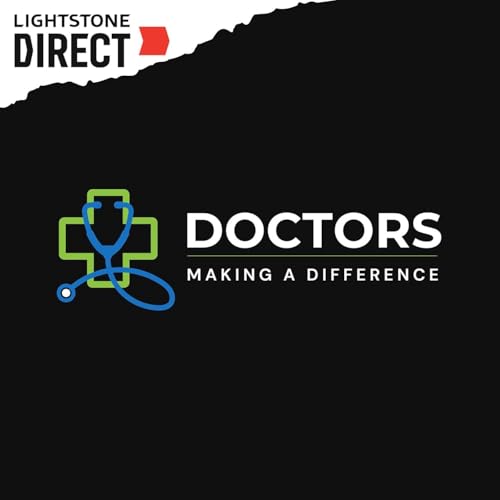This episode is sponsored by Lightstone DIRECT. Lightstone DIRECT invites you to partner with a $12B AUM real estate institution as you grow your portfolio. Access the same single-asset multifamily and industrial deals Lightstone pursues with its own capital – Lightstone co-invests a minimum of 20% in each deal alongside individual investors like you. You’re an institution. Time to invest like one.
–
This special New Year’s solo episode is both a thank-you and a reckoning.
After thousands of downloads and countless conversations with physicians making a difference, Dr. Peter Crane pauses to reflect on the heart of the work — and the responsibility that comes with wearing the white coat.
As both a physician and a patient, Dr. Crane shares how a massive retroperitoneal tumor diagnosis at age 43 reshaped his understanding of medicine, trust, and healing. What mattered most wasn’t statistics or algorithms — it was presence, compassion, and the collective expertise of a medical team showing up when everything was on the line.
This episode explores:
- Why trust in physicians feels fragile — but deeply personal
- How being a healer goes beyond protocols and prescriptions
- The growing shift of medical information away from physicians
- Why advocacy, financial independence, and alignment protect both doctors and patients
- And how medicine can — and must — be left better than we found it
This is a reflective, grounded conversation for physicians navigating burnout, identity, purpose, and the future of medicine.
Episode Highlights✨ The moment medicine became deeply personal
✨ Why patients don’t just need answers — they need reassurance
✨ What cancer taught Dr. Crane about trust and teamwork
✨ The difference between being a provider and being a healer
✨ Why burnout isn’t about weakness — it’s about misalignment
✨ How financial independence gives physicians ethical freedom
✨ Why disability insurance matters more than we want to admit
✨ The power of local advocacy and state medical involvement
✨ How physicians can rebuild trust — one patient at a time
Top 3 Takeaways- Healing is relational, not algorithmic
- Physicians who are aligned and financially secure are better advocates.
- Medicine is still a calling — but it must be protected to survive.
About the Host:
Dr. Peter Crane is a board-certified physician, educator, and storyteller with a heart for service and a calling to spotlight doctors who make a difference—in their communities, in medicine, and in the lives they touch.
Through Doctors Making a Difference, he brings you into intimate conversations with physicians who have overcome challenges, redefined success, and found purpose in and beyond the clinic. His goal is simple: to help more doctors stay in medicine by showing them what's possible.
About the Show:Doctors Making a Difference is more than a podcast—it’s a movement to highlight the good, the gritty, and the deeply human side of medicine.
In every episode, Dr. Peter Crane interviews physicians whose stories defy the script. From burnout recovery to bold career pivots, health challenges to quiet leadership, this show honors the truth that healing begins with connection—and doctors, too, deserve to be whole.
Visit: doctorsmakingadifference.com
LMC Series Note:Living with Metastatic Cancer (LMC) explores the science, decisions, and day-to-day realities of life with advanced disease—through candid physician–patient conversations.
The Doctors Making a Difference Podcast is for informational purposes only and does not substitute for medical, legal, or professional advice. Always consult appropriate experts regarding your unique circumstances.
Hosted by Simplecast, an AdsWizz company. See pcm.adswizz.com for information about our collection and use of personal data for advertising.
 37 mins
37 mins 44 mins
44 mins 29 mins
29 mins 41 mins
41 mins 40 mins
40 mins Dec 11 202541 mins
Dec 11 202541 mins Dec 4 202540 mins
Dec 4 202540 mins 39 mins
39 mins
